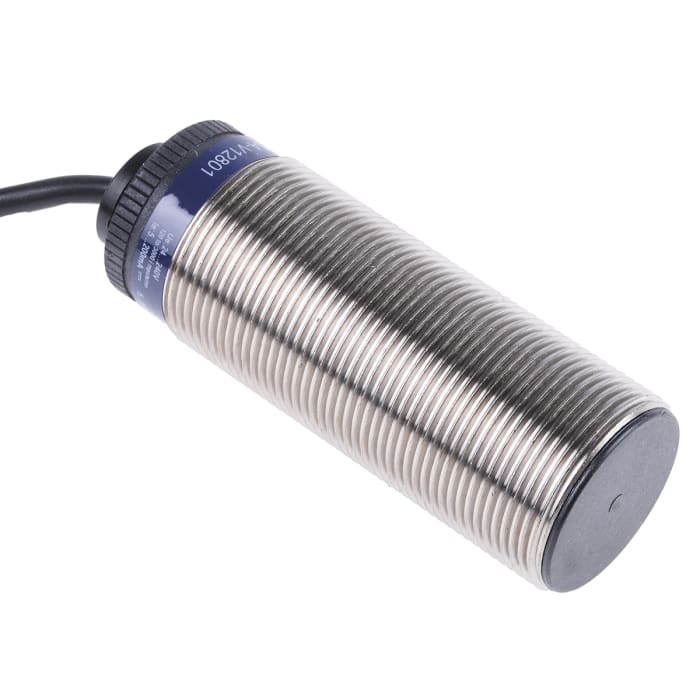Telemecanique Sensors Inductive Threaded Barrel Proximity Sensor, M30, 10 mm Detection, 2-Wire NC, 20 → 210 V

Technical Document
Specifications
Thread Size
M30
Sensor Technology
Inductive
Body Style
Threaded Barrel
Detection Range
10 mm
Output Function
NC
Digital Switching Output Type
2-Wire
Cable Length
2m
Connection Type
Pre-Cabled
Supply Voltage
20 → 210 V dc, 20 → 264 V ac
IP Rating
IP67
Length
81mm
Mounting Type
Flush
Housing Material
Metal
Maximum dc Voltage
264V
Minimum Operating Temperature
-25°C
Maximum ac Voltage
264V
Shielding
Shielded
Maximum Switching Frequency
100Hz
Switching Current
200 mA, 300 mA
Switching Frequency
100 Hz
Series
OsiSense XS
Maximum Operating Temperature
+70°C
Country of Origin
France
Product details
Telemecanique Inductive Sensors
Introducing Telemecaniques M30 Rotation Monitoring range of inductive proximity sensors which have been created and designed for use within applications with applications where metal detection is required. These Telemecanique cylindrical OsiSense XS inductive proximity sensors are designed for non-contact sensing of metal objects up to 60mm. They feature LED status display with a flush mountable brass body, each one has a pre-wired 2m cable and reverse polarity protection. They will predominantly be found in applications within the food and beverage industry.
How do they work and where can I use them?
Inductive proximity sensors contain a coil and an oscillator, these create an electromagnetic field close to the sensing surface. When metal enters this field, a change occurs in the oscillating amplitude. This, in turn, changes the sensor output, showing the user and/or corresponding equipment that metal has been sensed. Inductive proximity sensors are suitable for use in virtually any industry. Common applications include the food and beverage industry, robotics, machine tools, packaging and materials handling and so much more. Inductive sensors are unaffected by oil, dirt or surface finish and can be used in high vibration and high shock areas.
P.O.A.
1
P.O.A.
1
Stock information temporarily unavailable.
Please check again later.
Technical Document
Specifications
Thread Size
M30
Sensor Technology
Inductive
Body Style
Threaded Barrel
Detection Range
10 mm
Output Function
NC
Digital Switching Output Type
2-Wire
Cable Length
2m
Connection Type
Pre-Cabled
Supply Voltage
20 → 210 V dc, 20 → 264 V ac
IP Rating
IP67
Length
81mm
Mounting Type
Flush
Housing Material
Metal
Maximum dc Voltage
264V
Minimum Operating Temperature
-25°C
Maximum ac Voltage
264V
Shielding
Shielded
Maximum Switching Frequency
100Hz
Switching Current
200 mA, 300 mA
Switching Frequency
100 Hz
Series
OsiSense XS
Maximum Operating Temperature
+70°C
Country of Origin
France
Product details
Telemecanique Inductive Sensors
Introducing Telemecaniques M30 Rotation Monitoring range of inductive proximity sensors which have been created and designed for use within applications with applications where metal detection is required. These Telemecanique cylindrical OsiSense XS inductive proximity sensors are designed for non-contact sensing of metal objects up to 60mm. They feature LED status display with a flush mountable brass body, each one has a pre-wired 2m cable and reverse polarity protection. They will predominantly be found in applications within the food and beverage industry.
How do they work and where can I use them?
Inductive proximity sensors contain a coil and an oscillator, these create an electromagnetic field close to the sensing surface. When metal enters this field, a change occurs in the oscillating amplitude. This, in turn, changes the sensor output, showing the user and/or corresponding equipment that metal has been sensed. Inductive proximity sensors are suitable for use in virtually any industry. Common applications include the food and beverage industry, robotics, machine tools, packaging and materials handling and so much more. Inductive sensors are unaffected by oil, dirt or surface finish and can be used in high vibration and high shock areas.
